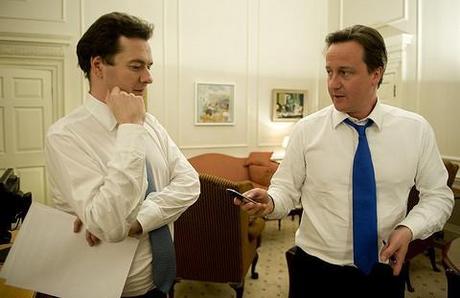 Chancellor George Osborne with PM David Cameron. Photo Photo credit: Andrew Parsons/Conservative Party
Chancellor George Osborne with PM David Cameron. Photo Photo credit: Andrew Parsons/Conservative Party
The background
According to the latest Guardian/ICM poll, net satisfaction with Osborne, the chief architect of the Coalition’s economic policy, has fallen to -32. That makes Osborne more unpopular than beleaguered Liberal Democrat leader Nick Clegg (whose rating is -26). In addition, 48 percent of voters say that Osborne should lose his job in next week’s expected cabinet reshuffle (11 percent have no opinion), more than for any other cabinet minister.
This figure rises to 52 percent among the over 65s and 53 percent among those aged between 35 and 64 – the age groups most likely to vote – and includes 39 percent of those who voted Conservative in 2010. By 44 percent to 43 percent, more 2010 Tory voters than not now say that Osborne is doing a bad job, noted The Staggers, The New Statesman’s rolling politics blog.
Osborne: The weak link who’s unlikely to be ditched
“George Osborne has been identified as the government’s weak link in a fresh poll showing that nearly half of voters believe he should be removed as chancellor in the forthcoming cabinet reshuffle,” reported The Guardian, which said that Cameron is planning a shakeup “that will go beyond the middle and junior ranks of his government.” The newspaper said that Cameron “is widely expected to keep Osborne in his post for two broad reasons. First, the chancellor is his closest cabinet ally who plays an indispensable role in the day-to-day running of the government and in setting the broader strategy in the run up to the next general election. Second, as a keen student of Margaret Thatcher, Cameron believes that changing a chancellor midway through a parliament would send a dangerous signal to the markets.”
Cameron told Sky News earlier this month: “George Osborne is doing an excellent job in very difficult circumstances and he has my full support in going on doing that job.” Asked if he would still be in place in 2015, he replied: “He’s not going anywhere… yes.”
Removal of Osborne wouldn’t solve Cameron’s mounting problems
“Unless accompanied by a change in economic policy, the removal of Osborne would, in any case, prove a false panacea,” argued George Eaton at The Staggers, The New Statesman’s rolling politics blog. “Until Cameron recognises the need for the government to stimulate growth through tax cuts and higher spending (and abandons the myth that you can’t ‘borrow your way out of a debt crisis’), his party’s fortunes will not improve… With or without Osborne, Cameron’s priority must be to finally adopt a strategy that works.”
Cameron and Osborne come as a unit
Writing at Coffee House, The Spectator blog, Sebastian Payne argued that Osborne is Cameron’s “core headache.” “They are a unit: Cameron in 2005 decided to keep his friend as Shadow Chancellor and keep him there after the crash. It was one of the biggest calls of his premiership. It remains a controversial decision. The public remain just as unhappy with the the Prime Minister’s choice of Chancellor as with the government’s economic record.” Payne concluded that “if Osborne fails, he and Cameron will fall together. More than any Prime Minister and Chancellor of recent times, they come as a unit. The praise, and criticism, should be directed at both.”
It’s Tory outriders that Osborne should fear the most
Writing at The Financial Times, Janan Ganesh said that Osborne should “fear angry Tory outriders.” “If the left are dogged enemies of austerity, the right are only fair-weather friends. Avowed believers in a small state often prefer the principle to some of its practical implications. Sadly for the chancellor, their angry incoherence does not end there. Many of them deride his deficit-reduction plan for falling behind schedule and insist that he should have cut deeper and faster.” “If Mr Osborne has erred, it is not on the side of caution,” concluded Ganesh. “He was too cavalier in his assumptions about growth, too confident of his ability to rebalance the economy away from finance and towards industry, too complacent about the prospect of global upheaval disrupting his plans.”

